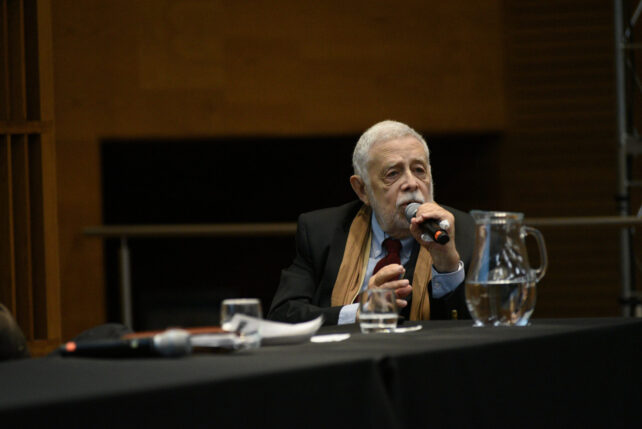
Buenos Aires, 7 July 2023 (IICA) – “I firmly believe that the future of our region hinges on consolidating the bioeconomy as a vision for development” maintained Eduardo Trigo, global expert on agricultural development and advisor to the Innovation and Bioeconomy Program of the Inter-American Institute for Cooperation on Agriculture (IICA). Trigo delivered one of the anticipated addresses at the 27th Annual Conference of the International Consortium on Applied Bioeconomy Research (ICABR), which brought together the world’s leading researchers and scientists in Buenos Aires for four days of work and discussion.
“The bioeconomy can be defined as the use of biological resources to produce goods and services throughout the length and breadth of the economy. Undoubtedly, it represents a tremendous development opportunity for Latin America and the Caribbean, as this region is one of if not the most important photosynthetic platform of the planet. By this I mean our potential to transform solar energy into energy that can be used by humanity. As such, we are in a position to create multiple alternatives to the fossil fuel economy. It places us ahead of the race in tackling the challenges in coming decades, due to climate change and the need to achieve the Sustainable Development Goals (SDG), which are still far out of our reach”.
Trigo was delivering his address at the auditorium of Argentina’s Ministry of Science, Technology and Innovation (MinCyT) – the venue of this high-level scientific meeting, co-organized by the Government of Argentina, ICABR and IICA. For the last six years, the rural development organization of the hemisphere has assisted countries to raise awareness, build capacities, strengthen policies and promote bioeconomy businesses in the region’s agricultural value chains.
The region produces vast amounts of biomass that will open the door to tremendous development of the bioeconomy, thereby improving the standard of living of rural inhabitants in the hemisphere. The eminent specialist reflected that, “Biomass always has a territorial dimension. I always say that biomass does not travel well, because it is not economical to transport it very long distances. This differs considerably from petroleum and is based on the fact that the energy concentrations are very different. Therefore, biomass must be processed and used locally, which will mean completely changing the territorial development model, thereby creating significant opportunities for rural areas in our region”.
Trigo has a Doctorate in Agricultural Economics from the University of Wisconsin and boasts extensive experience as a consultant to national and international technical organizations on bioeconomy-related issues and on science and technology applied to agricultural production. Therefore, he was one of the most well-respected voices among the more than 150 scientists from the Americas, Europe and Africa at the Buenos Aires meeting.
“The fact that this conference is being held in Latin America reflects the importance of the region in the global bioeconomy. We have a tremendous opportunity to interact with the most advanced countries and the most prestigious scientists. I don’t think I am mistaken in considering this conference to be the most significant global event for discussions on the future direction of the bioeconomy”, he said.
From the start of time
During his presentation, entitled “Towards a Research Agenda to Build the Bioeconomy as an Approach to Sustainable Development”, Trigo insisted that the bioeconomy, far from being a novelty, has been around practically as long as humanity.
“The bioeconomy has been with us since the beginning of time, regardless of how we define it. It has been present in all societies, in different ways, depending on the era. We have always used knowledge to harness biological elements. With agriculture, fermentation and biofuels, we were engaging in the bioeconomy, without knowing it. Therefore, the bioeconomy is very traditional but also something very modern, he explained”.
The expert went on to say that although the bioeconomy is always based on the use of natural resources for industrial activity, from the point-of-view of technology, there are major differences between how it is implemented in mature economies versus in developing countries. He feels that the region should focus on integrating small farmers into the bioeconomy.
“Latin America and the Caribbean has 21 million agricultural production units, two thirds of which are family operations. This is too high of a number for the bioeconomy to progress without creating an effective proposal on how to integrate this sector”.
“We have eight of the fifteen most megabiodiverse countries in the world and the fact that diversity is a strategic resource is no longer disputed by anyone. We must embark on pathways to take advantage of this asset”, he concluded.

This news release directly relates to my experiments in making distinctive paper from Dominica’s abundant natural resources. Also, Carol Sorhaindo’s research into natural dyes and pigments.
Samples of my papers can be seen at: https://sculpturestudiodominica.blogspot.com/2017/07/knee-deep-in-paper.html